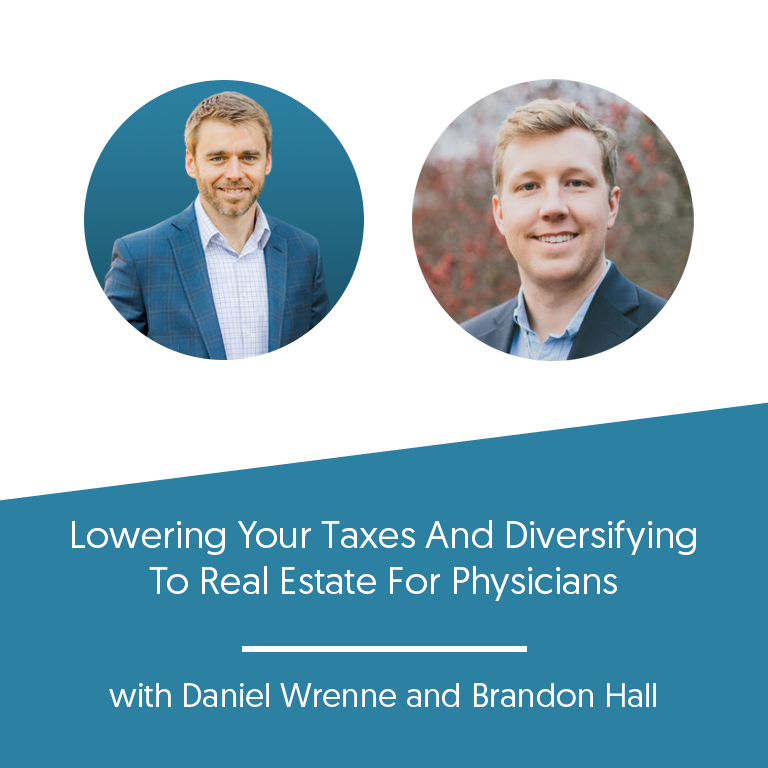Episode Transcript
What's up guys
I am your host Daniel Wren and I'm excited to do another one of these question and answer shows, which we'll be doing more in the future. For now, we're going to be just grabbing some topics that have been hit on in the Facebook group to talk about, but in the future we'll kind of see how it evolves.
For the time being, just feel free to throw out questions if you have specific questions or things you feel like would be good to talk about. Please feel free to throw those in the the Physician Finance Facebook group and we'll be grabbing questions from there to chat on in In the short term. I am also excited to introduce my co's for today Jeff Winger My boy Jeff Jeff you want to throw out a little intro.
Oh boy. I'm
your boy. Yeah I am Jeff Winger and I am a certified financial planner that works by day with Daniel Wren and financial planning but Just love getting into personal finance. And, um, I got there, my own journey to personal finance was actually through the fire movement. It turns out I love my job, so I don't know if I'll retire, but that's kind of how I, how I met Daniel in the first place.
And so a little bit of a different journey
there. You're a fire turned just F I focused. You dropped the R E.
That's right. Just bye.
Yeah. So Jeff and I work by day, working with families, one on one helping them through planning, physician families. And so we have a lot of experience, like, you know, in the thick of the families that we work with.
but our goal with this show is to kind of talk through kind of more educational general content, but also we want to make sure we're. questions and talking about, you know, the things you want to talk about. So that's kind of the purpose behind this is we want to really, throw out questions, encourage questions and talk about it because that's what matters most.
We want to make sure we're covering topics that are most important to you. so we'll just. We're going to cover one question. We can talk about these things. So you got two finance geeks on this. So we can probably talk about any one of these questions for hours. Uh, so we're going to keep it to like, you know, 10 minutes max.
maybe we'll shoot for even five, let's say five and then. We'll cap it at 10, as far as talking about it. So question we're going to cover today. So question came up in the Physician Finance Facebook group. So a question came up about UTMAs versus IBONs for saving for college education.
you know, which one is the best route? So Jeff, you want to kick this thing off?
Sure. So I think that the question delineates just two options at this point. So maybe it's a good thing to start with what those two options are. Yeah. Right. And so maybe I'll just kick it back to you real quick. Can you quickly tell us what is an UTMA
or
an UGMA?
Yeah. So UTMA or UGMA, it kind of varies based on which state you're in. It's basically, an account the adult sets up and it's, Owned technically by a minor, a child. So a lot of times parents will set up Atma or Agma accounts for their children. And by doing so, they're setting up an account in their child's name.
And it's called an Atma. People usually call it an Atma when we're, when they're talking about investment accounts. and so the UTMA is basically the investment account that the parent sets up for the child. And there's some special rules that, you know, follow based on it being an UTMA. It's like the kiddie tax rules come into play, which there's a little bit of, the way I explain it is, there's a little bit of tax benefit that comes with an UTMA, is the big advantage to it.
The big downside to it is that the child owns it. So, when they become... An adult, depending on the state that they're in, what they define that as when they become an adult, they have full control over it. So that's typically, you know, considered the downside. So that's what an is. I mean, is it basically just a normal investment account, but in the children's name and you get a little bit of tax benefit, check out the kitty tax rules for more info on that downside is they get control at, at, uh, adulted.
All right. So that's
a good summary of,
of the Atma I bonds. Nobody was talking about I bonds. Like. Six months ago. Right. A year. Right.
Those are, those are pretty cool these days. Um, yep. A lot of, a lot of press about iboss
right now. Yeah. You wanna do IBOs or I'll do, sure. I'll, I'll give a,
a brief
overview of IBOs, right?
Yeah. Tell us about IBOs.
So IBOs are bonds that are linked to inflation. And so, traditionally speaking well. They go with inflation, they adjust their rates every six months, and, they can have a tax benefit in the future, where if you were going to use it for education, it can be tax free on the growth there, the interest component of it.
Mm hmm. but, so, the big thing is it tracks inflation, right? Mm hmm. And so, uh, in 2022... Inflation's a little bit higher than it has been in the past, right?
Right. But what's interesting is we never, like, I've never once seen, so we get to talk to hundreds and hundreds of families about their money, I've never once seen someone with I bonds.
As their education savings vehicle. Right. Have you, Jeff?
I, no, I don't have, I don't, I can't recall one, one person that has had those prior to this year. Um, with the
plan of education. Right. And if you, so the reason I think that is, is because inflation is normally not very good. I mean, not, inflation is what it is.
That's like, all it is, is just like your dollar is becoming less valuable. So, this vehicle. Is going to return exactly what the inflation rate is. That's how it's designed. Right? So it's a government bond. That's basically just pinned to inflation. It's only really true way to kind of track with inflation, but long term inflation is basically just breaking even is the way I view it.
It's like. If your dollar is just at, is just returning what inflation is, your dollar is basically worth the same thing as what it was before. So I think that's the problem with education savings. You know, normally you're talking about a longer term goal. Now, if we're talking about your saving for education next year, iBond is a home run.
Like, you can't beat that. If you need, say you need to spend 10, 000 on your kids, tuition, education expenses next year, or let's say 12 months plus. So there's a, iBonds work especially well when you got 12 months at least, but you're only gonna need to do it for a year. You know, iBonds are great because you just can't find anything that's gonna pay that.
Kind of right. but the problem is most people are like, well, no, no, no. I'm saving my child was just born or I have a young child and I'm saving for their education. 15 plus years from now. Yeah. Help me
out, Daniel. I just, I just had a daughter a month ago,
right?
Yeah. So, you know, I don't think I just want to have my dollars that I put away for that.
Just kind of stay, keep their purchasing power. I think we want to probably grow those some.
Yeah, I mean, ideally, right, you know, at least you want to beat inflation. To me, that's the baseline is we at least want to higher than inflation. And so that's the whole problem with I bonds is like best case or.
It is what it is. You're going to keep pace with inflation and that's what it is. And not only, not even education inflation, like you're keeping pace with overall inflation. So if college costs inflate higher than inflation, you're basically losing out. so that's the big downside with I bonds, is long term inflation is kind of like.
The baseline of which keeping pace with your dollar, maintaining the same value. And typically it doesn't work well for a longterm savings vehicle if you want to, you know, maximize your return. But the upside is it's really high right now. Inflation,
right? So if I've got a 16 or 17 year old, like you said, that's not
a bad idea.
no, now there are caps, right? So you can only put in 10, 000 a year and I bonds. Well, I think you can put an extra five in on top of that if you do some. Yeah, you
can do some wiggle, some, little, financial gymnastics and get some more in there too. But for the, the bang for the buck, I think 10, 000 per person
is really kind of the easy route.
And you got to go on the Treasury Direct website and there's, you know, you can do it all through their website. Put in 10, 000 per individual, and so, yeah, I mean, that could be a great short term education, route.


